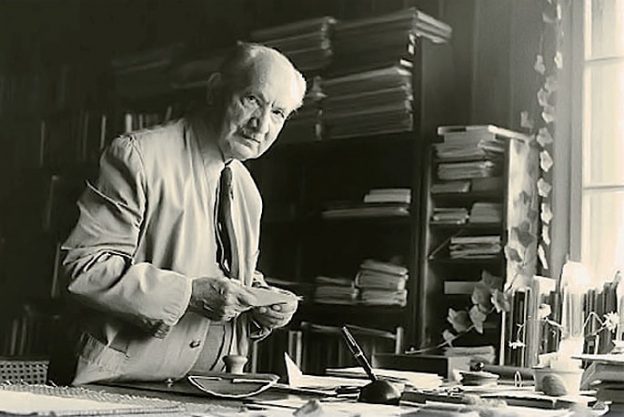Karl Lowith’s (1897-1973) Martin Heidegger and European Nihilism is a very revealing book coming from a former student of the German existentialist warlock whose influence was very seductive throughout the 20th century in spite of his strong Nazi affiliations – an episode in which no repentance was ever offered. Heidegger firmly believed the heart of National Socialism had an inner greatness to it. Yet, many leftist academics, who pride themselves in their holy war against so-called ‘right wing’ fascism, devoured his writings dedicated to the destrucktion of the Judeo-Christian transcendental worldview and the western academy built upon its foundations. Such destruction, largely influenced by Heidegger’s (1889-1976) own existential mindlessness devoid of presumed enslaving empirical facts based on transcendental reason, has left the western academy in the throes of nihilism which was/is at the very heart of fascist philosophy so popular these days across the board. Thanks to their own postmodern nihilism which values existential life over the rational facts of reason and empirical history, many leftists now think they are anti-fascists, even though they have swallowed Heidegger’s fascist horse pill which continues to misdirect all studies of 20th century western historiography, particularly in its obfuscation as to what National Socialism was largely all about. Worse, although always very unforgiving toward Jews and Christians, western academics foolishly forgave Heidegger for his Nazi past, presuming it was an inexplicable aberration based on some kind of childish political naivety – without the slightest realization they were/are absorbing the very fascism they presumed they were against.
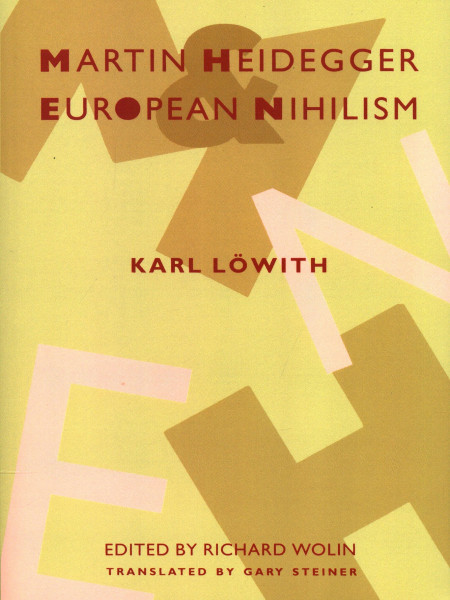
Karl Lowith thus wrote his Martin Heidegger and European Nihilsm to try and help correct this gigantic academic blind spot. Yet, though Jewish, even Lowith has a hard time in separating himself from his fascist mentor showing just how seductive fascism actually was when understood in factual reality as opposed to simplistic leftist caricatures which cannot explain how the madness of National Socialism presumably overtook one of the most progressive and civilized countries in the world. The idea that the maniac Hitler took over all Germany by fooling everyone with his racist rants is part and parcel of the propaganda foisted upon the world through German academics and the German media in order to absolve them of their great guilt in following and working for the Fuhrer that led to the destruction of 50 million lives. Other Jewish students outside of Lowith, all of whom who prided themselves in their leftist acumen and who also had great influences over western leftism in general, learned much from the Nazi philosopher as well, including the likes of Herbert Marcuse, Hans Jonas, and Hannah Arendt – all intellectual and political heavyweights in their own right.
Even the French existentialist Sartre, who loved Nietzsche as much as both Heidegger and Lowith, was heavily influenced by the German sage too. Lowith thus asks out loud, “Why do we accept from him something we could hardly let anyone else get away with?” Most of the academic western madness of the 20th century has yet to answer this insightful question coming from one of Heidegger’s most studied students who spent almost an entire decade being discipled by his mentor, Martin Heidegger. Lowith received his doctoral habilitation under Heidegger’s tutelage as he mastered the writings of Friedrich Nietzsche (1844-1900). Nietzsche was the German atheist of the 19th century who prophesied of the coming superman since western reason had supposedly killed the God of the Bible. Within a quarter of century after his death, many National Socialists presumed they were an existential fulfillment, no pun intended, of Nietzsche’s superman anti-ethical will to power, which at the time was presumed to have transcended western reason and the Enlightenment with a gigantic “Triumph of the Will” – all showcased on film of the same name by Leni Riefenstahl in 1934.
Of much more interest, and a question not asked, is how can a Jewish student like Lowith deeply study for many years the very philosophy which was conjured up to destroy him as a Jew? Why are so many academics nihilistic and suicidal? Who would want to even bother to teach something as deathly as nihilism? Nihilism, so popular today, is a death cult – all of which was existentially proved by both world wars as Lowith points out. How is that Lowith could not plumb the depths of it? It is largely because he and others did not view themselves as Jews, but rather as Germans. It was thus all too late before he and others understood all this when 1933 rolled around.
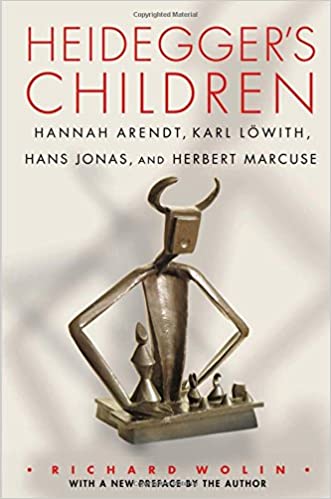
Worse, their existentialist studies of the 1920’s did nothing to prepare them for shocking realities of the 1930’s as Heidegger’s musings were only abstractly understood by his naïve Jewish students. Their anti-reason existentialism actually prevented them from seeing the coming dangers of National Socialism, and even caused them to miss the whole point after the war was over. After the first world war, Lowith dropped Jewish professor, Edmund Husserl (1859-1938), for Heidegger, who was Husserl’s assistant at the time. Lowith was Heidegger’s disciple for an entire decade throughout the 1920’s. Heidegger then became openly anti-Semitic in the 1930’s, which was not discussed much by Lowith in his book, only that Heidegger did become a Nazi. What was not understood by Lowith was the deep-seated inner antisemitism of nihilism. Even worse, after the war Heidegger denied the magnitude of the Holocaust by reducing Jewish deaths down to hundreds of thousands rather than millions. While perhaps Heidegger’s true extent of his antisemitism was kept hidden until long after he died, it is still true he tried to “bring into line” Freiburg University under the complete control of National Socialist indoctrination during the early 1930’s. Heidegger was thus very involved in removing Jewish professors as part of the same program which many knew about all too well. Heidegger even personally signed a Nazi academic document which forbid Husserl from using the Freiburg University Library. All of these facts were well known, but the existentialism of these Jewish scholars prevented them from seeing all this as seriously as they should have. What did Martin Heidegger’s philosophy look like existentially speaking? The early years of National Socialism provide the answer to that question. How is that they could not see that he was spoon feeding them fascism all along? The mindlessness of existentialism is the answer to this question.
Lowith himself, was forced to leave Germany during the 1930’s, yet he strangely found solace in both fascist Italy and fascist Japan before finally being forced to move to America. After the war, he unsurprisingly found himself back in Germany. Even then, Lowith still could not shake himself completely of either Nietzsche or Heidegger, but he was much more critical of both of them. Lowith understood full well that the German Academy of the 1800’s played a very decisive role in all of the wanton destruction that was World War II, “The European crisis was in the first instance a spiritual crisis. The fatal die had already been cast by the mid-nineteenth century, as European thinkers decisively turned their backs on the classicism of Goethe and Hegel. Increasingly, they grew impatient with values that were ‘timeless’ or that transcended the finitude of human temporal existence. As a result, not God, but man became the measure of all value and meaning. It was a trend that reached its zenith with Marx’s veneration of the proletariat and Nietzsche’s enthronement of the superman as a supreme category of historical existence.” While Marxism led to the brutality of the gulag, Nietzschean existentialism converted Europe into a gigantic concentration camp system, augmented with death camps set up for Jews. The European academy of the 1800’s thus led to “a fatal misstep. It meant that there no longer existed any effective limitations or constraints upon the sovereignty of the human will. After all, had not Nietzsche felicitously described his later philosophy in terms of ‘the will to power’?” Lowith thus concluded that “the removal of all traditional constraints, along with the triumph of radical historicism, loosened the floodgates of European nihilism.”

While Heidegger preached destruktion, the Nazis actually practiced it politically and militarily. Who is more existentially authentic is thus much more of a toss-up than Heidegger himself admitted. Indeed, the Nazis extolled the existentialist willpower of Nietzsche as much, if not even moreso than either Heidegger or Lowith. In fact, the Nazis were existentially, i.e., actually willing to do something about the problem of eliminating the false dominating transcendence of the Judeo-Christian worldview, not just talk or complain about it like so many academics. Again, how is that such an acute thinker as Lowith was not able to completely extricate himself from such nihilism? While he criticizes Heidegger in this book, and also criticizes Nietzsche in another book entitled Nietzsche’s Philosophy of the Eternal Recurrence of the Same published in 1978, there is a still a fatal attraction which Lowith has for both of his German heroes.

Lowith even shows throughout that Heidegger’s so-called turning, which many leftist academics have parked on to distance the German wizard away from his National Socialist past, was not much of a repentance after all. In fact, Lowith shows how Heidegger’s thought deepened all the problems brought up by his previous book on Being and Time published in 1927 before the destruction of Europe under the National Socialist banner. Even Heidegger himself after the war complained that the problem with the Nazis was that they were not existentialist enough. They were thus unable to break away from the false enslaving rationalism of Germany’s Enlightenment past that needs to be jettisoned in favor of real authentic life in the face of death by letting existential “Being” simply “be.” Heidegger thus replaced Schopenhauer’s (1788-1860) and Nietzsche’s existentialism of the 19th century based on willpower with a more thoroughgoing emphasis upon “Being” so that even the will was absorbed and/or subdued by Being in a spiritual osmosis of sorts that neither Heidegger himself nor Lowith were able to explain properly. In other words, Heidegger’s so-called turning was a more thoroughgoing antihumanism. Whereas Schopenhauer and Nietzsche favored the will over the rational mind, so Heidegger favored the destruktion even of the will by allowing “Being” simply to “be.” With such a turning, in a matter of 300 years with Heidegger sitting at the rock bottom, the western academy not only destroyed religion and reason, but also the will as well. Welcome to the dystopia of nihilism, which is supposedly a belief in nothing transcendent whatsoever – not even the naturally given transcendent will, much less transcendent feelings (Romanticism), reason (Enlightenment), or faith (Christendom) which preceded Heidegger’s existentialist escapade into the postmodern nothingness of Being. Wonderful.
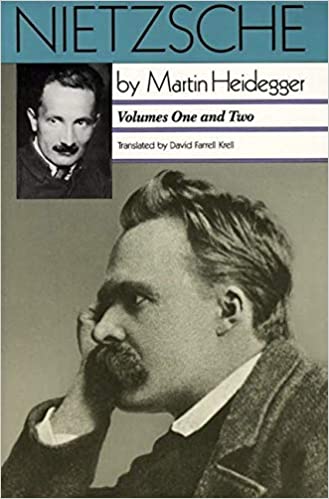
Even more amazing along similar lines is that Lowith goes on to show in his book how Nazi political philosopher Carl Schmitt’s political decisionism, i.e., political existentialism, or perhaps better understood as a “politics of Being,” was very similar to Heidegger’s philosophical outlook. Nazi politics was just as nihilistically naked as Heidegger’s fascist philosophy. Even more foolish still, while Heidegger and Schmitt were propagating resolute decisionism philosophically and politically devoid of reason and rationalism so that what exists is justified existentially even in the face as something as sordid as National Socialism, so theological existentialists like Kierkegaard, Gogarten, Barth, Brunner, Bultmann, Tillich, and even Bonhoeffer to some extent as well, promoted an anti-theological existentialism and decisionism which all coalesced together into a dynamite combination once the Fuhrer took over Germany. All such emphases being disseminated at the same time from virtually every point of view eventually led to the mindless German catastrophe of the 1930’s and 40’s which still has yet to be explained and explored properly, and whose influences still dominate the west’s educational institutions even today.
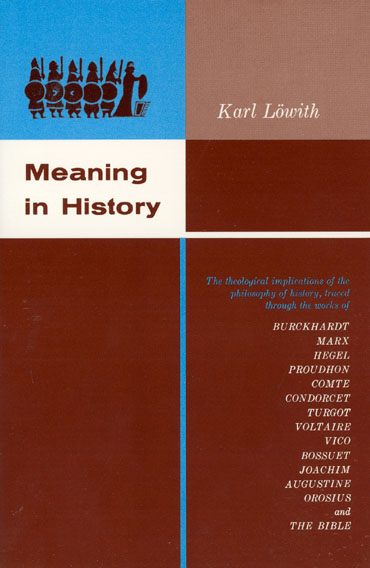
Perhaps most surprising of all in the case of Lowith, is how he then uses Judeo-Christian eschatology as a critique of Heidegger’s philosophy of Being and Time in order to demonstrate how the German wizard was not able to disentangle himself from the historical transcendence of the biblical worldview relative to creation, fall, history, and the apocalypse. Heidegger’s philosophy follows the same path which his own anti-transcendent existentialism could not escape from. Heidegger’s “Being” was semi-transcendent, a contradiction of his whole entire philosophy that was thus not properly existentially grounded. Before his book on Heidegger, Lowith also used Judeo-Christian eschatology to critique Nietzsche as well. Even before both of these books, Lowith wrote Meaning in History in 1949 where he easily shows how the modern belief in progress within history, i.e., progressivism, is a contradictory Judeo-Christian heresy that jettisons divine transcendence, and in so doing, tries to foolishly promote an eschatological secular utopia this side of the grave without the miraculous powers of the resurrection which was the very door hinge between the Old and New Testaments at the center of history to provide such a hopeful outcome. As such, all three books should perhaps be read as a trilogy of sorts. Indeed, even Heidegger prophetically and eschatologically opined in the late 1960’s, “Only a god can save us.” The National Socialist existentialist experiment was a failure. It was not existentialist enough as it succumbed to the same technical technological forces it originally stood opposed during the great pressures of total war. A much deeper existentialism focused on “Being” itself is thus necessary. The question then that Lowith asks is who is Heidegger’s god? Certainly not the transcendent Judeo-Christian God of the Scriptures who identified His very being as “I Am that I Am.” Perhaps Nietzsche’s book on the Antichrist is part of the tragic answer to that question? Indeed, the “man of desolation” as Daniel describes him, or the “abomination of desolation” as Jesus calls him, or the “man of destruction,” as Paul understands him, is coming. He will come to fulfill the absolute meaning of nihilism, and it will be a destruktion far beyond anything the National Socialism ever accomplished.
